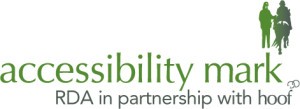Posted: 25th May 2016 | Back to news feed

Some horses and ponies are special, helping to bring a smile to the face of those who often find it difficult to show emotion.
Up and down the country there are many horses and ponies taking part in Accessibility Mark sessions adapting from their day to day riding school activities to meeting the challenges faced by disabled riders and those with learning difficulties.
Riding for the Disabled Association (RDA), in partnership with Hoof, the British Equestrian Federation’s (BEF) participation programme launched the Accessibility Mark scheme to encourage those who do not already partake in equestrian activities or would not usually have the opportunity to do so, to experience the many benefits that riding can bring.
It is not always the steady eddy or bombproof horse that makes the most suitable ride for disabled people, but they must be dependable, patient, understanding and intelligent.
It is a common misconception that horses that are slow and very quiet are the most suitable for disabled people when teaching a rider with little or no leg movement.
Unlike lead rein lessons when beginners are learning to ride, the horses and ponies that participate in Accessibility Mark sessions may be faced with a rider that requires up to three helpers. Accessibility Mark horses and ponies could be involved in a jumping lesson one hour and then be expected to be ridden by a rider with limited movement or be unpredictable in their behaviour the next.
Mounting and dismounting can often take longer with horses needing to stand quietly; this is often one of the main challenges faced by any horse or pony taking part in an Accessibility Mark session.
Understanding the need for routine is hugely important for autistic riders, as they can become easily upset by changes, this means ensuring they ride the same horse each time they visit.
People with autism can struggle with communication, but once on horseback they come to life and can shout out with excitement, for some horses this would be unnerving, for this reason riding centres tend to use their older more established horses and ponies.
At Grove House Stables LLP in Misterton, Nottinghamshire, Holly is a firm favourite with riders attending the Accessibility Mark sessions, and is a long standing member of the equine team.
The thoroughbred x welsh mare was bred locally and stands at 15hh making her the perfect ride for all, and has taught people of all ages to ride with her oldest customer being nearer in age to 80 than 70!
Her kind temperament and unflappable nature is now bringing pleasure to many who would previously not have thought riding was an activity available to them.
Grove House Stables owner Andrew Stennett said: “All our horses and ponies are held in high affection by our clients but they really hold a special place in the hearts of our Accessibility Mark clients, especially those with autism as they form a particularly close bond with the horse they ride.”
Accessibility Mark status is awarded to a riding centre that has been approved by RDA following training and assessment. The close link with the RDA means that they offer continuous support to the establishment to ensure they provide you with a first class service and an experience that aims to be hugely beneficial. There are currently 30 Accessibility Mark approved centres across the country.
To find your nearest RDA Group visit: www.equestrianindex.com/RDA
or Accessibility Mark centre visit www.rda.org.uk.

The Equestrian Index newsfeed is compiled from articles submitted by advertising members and expresses the opinions of those members. Watsons Directories Ltd shall not be held liable for any inaccuracies or mis-statements therein.
